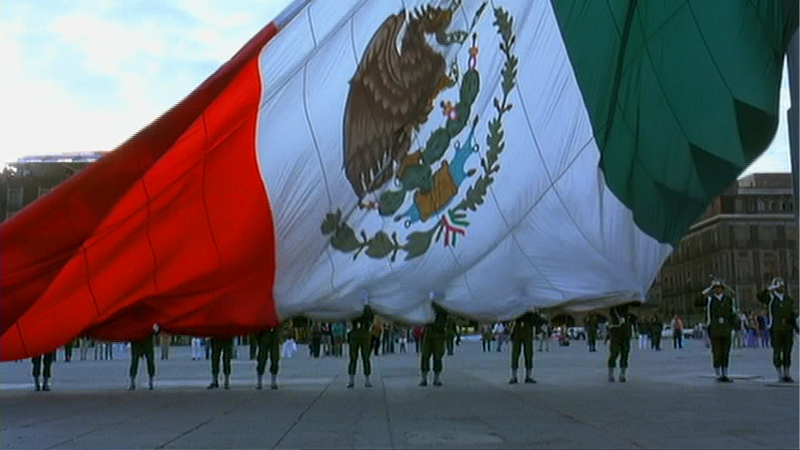CINCO DE VINYL!

In honor of none other than yours truly's birthday on this holiest of holy drunken days here on the Gold Coast, we thought we'd offer a series of essays about Mexican filmmaking. What with the recent aint-it-cute trend to name Alfonso Cuarón, Guillermo Del Toro and Alejandro González Iñárritu the Three Amigos, I, along with other colleagues, have thought to ask, what about the rest of the Mexican filmmakers that have made or are making seminal works?
My personal investment centers around a film I saw not too long ago, Battle in Heaven, and its director, Carlos Reygadas, who I'd like to argue trumps all Three Amigos. His cinema owes a lot to his admitted hero (and, yes, mine too), Andrei Tarkovsky as well as the hyper-aestheticized quotidian of Bresson's films: (1) the long take is preferred; (2) time in space is foregrounded, situating the film and the viewer inside the film's world; (3) all the actors are non-actors as to retain a level of realism -- and to deny viewers any pre-conceived notions of the actors, and by consequence, the characters, the film; (4) there's a religious aspect, of course, as the title alludes to; (5) there's a transcendence through both sex and violence, which links Reygadas to another Bresson acolyte, Paul Schrader; (6) sex is something of pageant but never exploitative, it happens as would anything else; (7) things just happen. But there's more of that below. For now, I'd like to cede the space to my fellow writers who will explain a bit of their approach to this project, this day, this neighbor of ours.
[Ryland Walker Knight]
I cannot claim to be an expert on anything related to Mexican cinema. I know that I have enjoyed everything else Mexican that I've experienced so far, including cuisine, music, and literature. Sure, I've seen some of the more modern, mainstream stuff like Y Tu Mama Tambien and Amores Perros. And I am not ashamed to have liked the hell out of those. So, after hearing such good stuff about Carlos Reygadas from RWK, I knew that the time was right to check out something that kinda flew under the radar screen for most of my fellow countrymen. I chose Reygadas' first feature length, Japón, which was released a few years back in 2002. My mind was blown, in the good way. I'll try to show how, below. Viva La Raza!
[Leile One]
Our first guest column, by Jennifer Stewart, speaks for itself. Her first paragraph:
I've tried to begin Pan's Labyrinth's apologia where the sting of your charge leaves it: namely, that its gory violence is voyeuristic, useless, and empty. This attack is a complicated one, I think. Without a principled objection to onscreen face pulverizing, then you must say what it is about the aesthetic and stylistic terms P'sL gives itself, such that its onscreen violence can't be justified (whereas it could, perhaps, in another film). Having said that, if you think such onscreen gore is never justified, then that's a moral highground which only ends the discussion. Instead, I assume that if I can provide an account of what the onscreen destruction of the rabbit hunter's face is doing, I'll have at least succeeded in providing what your indictment assumes is its lack of structural and thematic content. [What this kind of reading means for the status of a film being "good" or "bad" is - I find - a paralyzing question, but I'd welcome discussion from you less ataxic film buffs.]
 Luis Buñuel ties with Shohei Imamura as my favorite cinema cynic, so, naturally, he's my favorite Mexican director -- even though he was born, raised and educated in upper class Spain. In Mexico, Buñuel was no mere artistic tourist. Some see his years of making cheap Mexican comedies and melodramas as a colorful detour; for me, El, Susana, Illusion Travels by Streetcar, Nazarin, and Los Olvidados represent the director's greatest, most personal work (the Spanish masterpiece Viridiana notwithstanding). His later European provocations may have shown a little more freakish surrealism (and, of course, a lot more leg) but Mexico is where Buñuel really got his groove on -- and left his heart, I dare say. Let me persuade you with some pix and text.
Luis Buñuel ties with Shohei Imamura as my favorite cinema cynic, so, naturally, he's my favorite Mexican director -- even though he was born, raised and educated in upper class Spain. In Mexico, Buñuel was no mere artistic tourist. Some see his years of making cheap Mexican comedies and melodramas as a colorful detour; for me, El, Susana, Illusion Travels by Streetcar, Nazarin, and Los Olvidados represent the director's greatest, most personal work (the Spanish masterpiece Viridiana notwithstanding). His later European provocations may have shown a little more freakish surrealism (and, of course, a lot more leg) but Mexico is where Buñuel really got his groove on -- and left his heart, I dare say. Let me persuade you with some pix and text.[Steven Boone]
Easy access:
- Negotiating Battle in Heaven [Ryland Walker Knight]
- Everything is Everything: Beauty, Ugliness, and Universality in Reygadas' Japón [Leile One]
- Pan's Labyrinth's Apologia [Jennifer Stewart]
- Buñuel's Travelling Illusions [Steven Boone]




No comments:
Post a Comment